

Classic Opening Lines Get Dissected - Books. Wait, you're familiar with the Reed-Kellogg system?

And no, we're not talking about scanning the side of a cereal box for nutritional information (zing!). Okay so maybe we weren't all that familiar with it up until, like, today but it's a form of diagramming a sentence, based on its grammatical structure. It allows for us to see the relation between words and structure. In a nifty new poster, those smart people at Pop Chart Lab have created diagrams for a set of iconic opening lines from literature, from Nabokov to Wells to Vonnegut. You can see some of the selected ones below and then the entire poster underneath, which can be clicked for a bigger version. Trust us, it'll all make sense in the end. You can buy your own here (click to enlarge) Why Is Academic Writing So Academic? A few years ago, when I was a graduate student in English, I presented a paper at my department’s American Literature Colloquium.
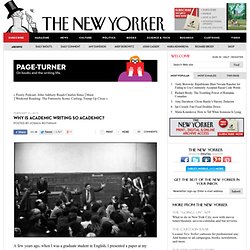
(A colloquium is a sort of writing workshop for graduate students.) The essay was about Thomas Kuhn, the historian of science. Kuhn had coined the term “paradigm shift,” and I described how this phrase had been used and abused, much to Kuhn’s dismay, by postmodern insurrectionists and nonsensical self-help gurus. People seemed to like the essay, but they were also uneasy about it. “I don’t think you’ll be able to publish this in an academic journal,” someone said.
Creators of the Hemingway App Explain Their Rules for Writing. This week, in the Times, Charles McGrath wrote about a newly digitized collection of ephemera from Ernest Hemingway’s Cuban estate, Finca Vigía, which confirms that the famously terse writer was, as McGrath says, “a hoarder.”
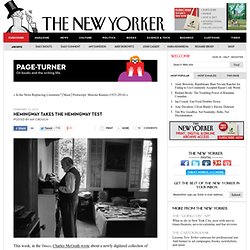
Ticket stubs, telegrams, Christmas cards, diary entries—all of it amassed in the twenty-plus years that Hemingway kept his house there. Amid the collection, McGrath identifies two notes that Hemingway had seemingly written to himself, in pencil. One reads: “You can phrase things clearer and better.” And the other: “You can remove words which are unnecessary and tighten up your prose.” Nabokov’s Exoneration: The Genesis and Genius of Lolita — Bruce Stone » Numéro Cinq. This is the hard lesson of Lolita; it is a monument to an awful existential truth: simply to be alive, in the face of the whole history of human suffering, requires a kind of insane fortitude.
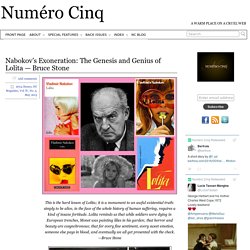
Lolita reminds us that while soldiers were dying in European trenches, Monet was painting lilies in his garden; that horror and beauty are cosynchronous; that for every fine sentiment, every sweet emotion, someone else pays in blood, and eventually we all get presented with the check. —Bruce Stone From the Stanley Kubrick film Lolita. On March 19, the literary marketplace welcomed a new title by the young Vladimir Nabokov, who hasn’t been greatly inconvenienced by his death in 1977. Nabokov’s Exoneration: The Genesis and Genius of Lolita — Bruce Stone » Numéro Cinq. Create dangerously: Albert Camus and his quest for meaning. ON a steady diet of Nietzsche and Dostoevsky, Humphrey Bogart might have played him in the film version.
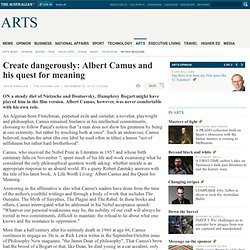
Albert Camus, however, was never comfortable with his own role. An Algerian-born Frenchman, perpetual exile and outsider, a novelist, playwright and philosopher, Camus remained freelance in his intellectual commitments, choosing to follow Pascal's notion that "a man does not show his greatness by being at one extremity, but rather by touching both at once". Such an endeavour, Camus believed, teaches the artist (the one label he used often in titles) a lesson "not of selfishness but rather hard brotherhood". Camus, who received the Nobel Prize in Literature in 1957 and whose birth centenary falls on November 7, spent much of his life and work examining what he considered the only philosophical question worth asking: whether suicide is an appropriate response to an absurd world. NPR Books : NPR. Image via harriscountypl Time for #fridayreads!

We’ve got folks from all over NPR this week — and some great backstories: Arts editor, and former travelling NPR producer, Deborah George: James Lee Burke’s Wayfaring Stranger. (It comes out in July.) The adventures of a young man from East Texas who encounters Bonnie and Clyde as a boy, fights in WW2, makes it big in the post-war oil boom and outwits various greedy, murderous villains. The last time I read Burke I was in a seedy hotel room in Accra with no phone and someone trying to break in. Alt.Latino co-host Felix Contreras: A preview copy of an upcoming memoir from musician Sheila Escovedo (aka Sheila E). Special correspondent Susan Stamberg: Goodbye, Columbus by Philip Roth. Books Maven Lynn Neary: Ballad of a Small Player by Lawrence Osborne.
TV critic Eric Deggans: The first of Questlove’s essays on hip-hop. BOOK RIOTGo From Zero to Well-Read in 100 Books. While we at the Riot take some time off to rest and catch up on our reading, we’re re-running some of our favorite posts from the last several months.

Enjoy our highlight reel, and we’ll be back with new stuff on Monday, January 6th. This post originally ran June 13, 2013. _________________________ Isn’t it strange that we have the term “well-read” but absolutely no one can come close to defining it? Thinking about this recently sucked me into a little thought-experiment: say someone had never read any literature and wanted to be well-read. This hypothetical forces any given answerer to do two things: provide their personal definition of well-read and then give a list of books that might satisfy that definition. Albert Camus' The Stranger. We were born at the beginning of the First World War.
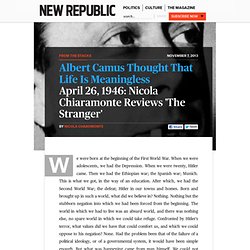
When we were adolescents, we had the Depression. When we were twenty, Hitler came. Then we had the Ethiopian war; the Spanish war; Munich.